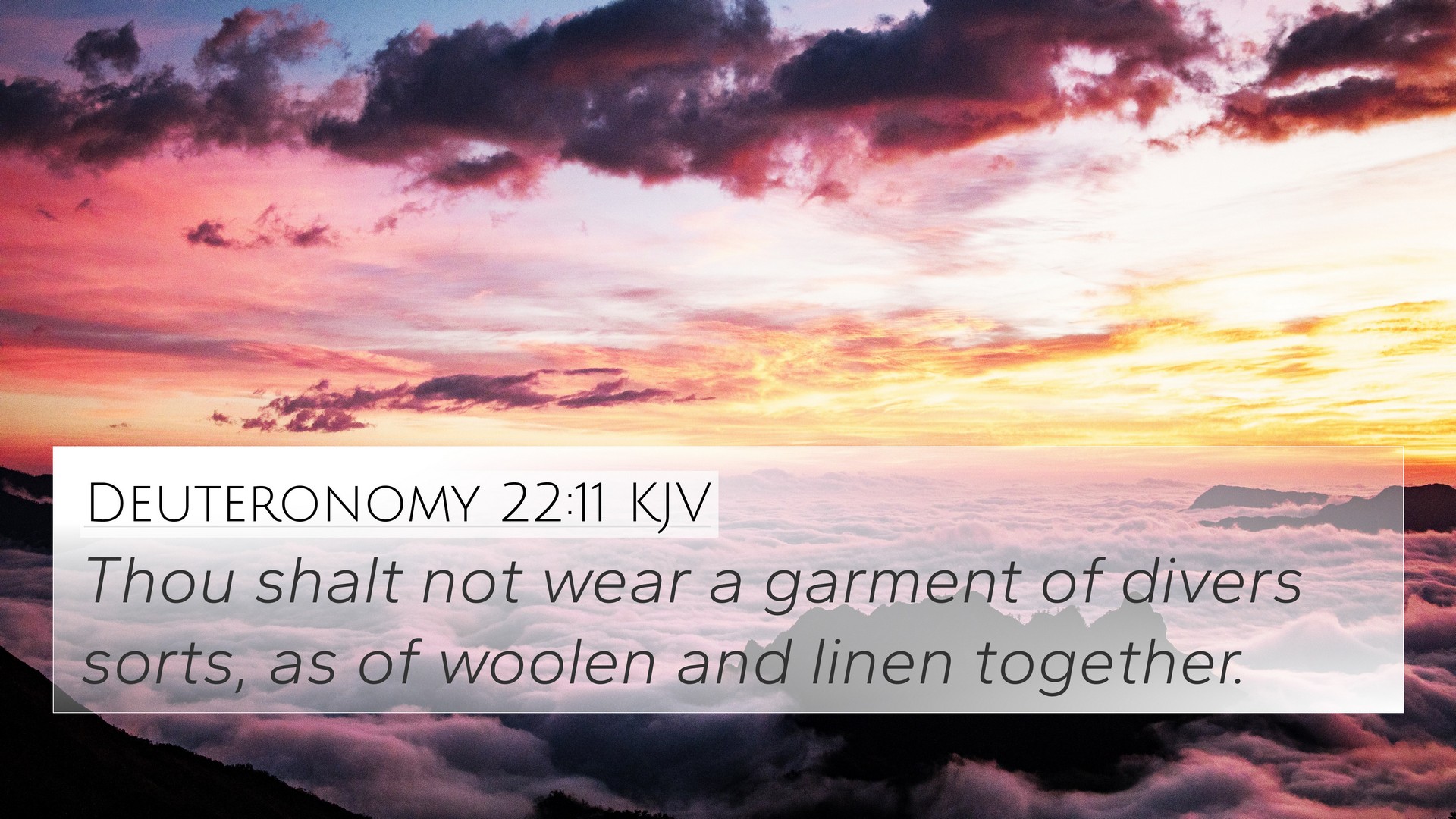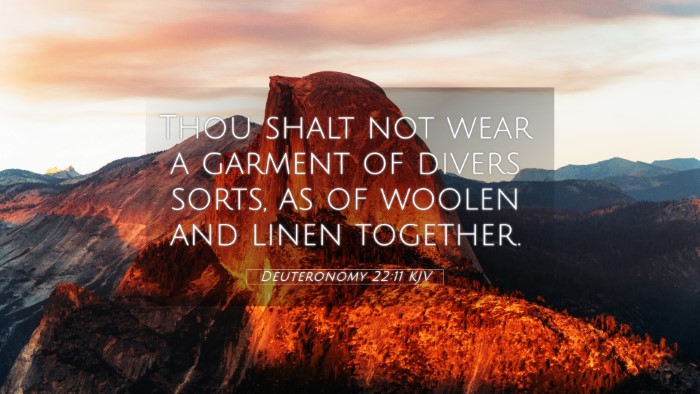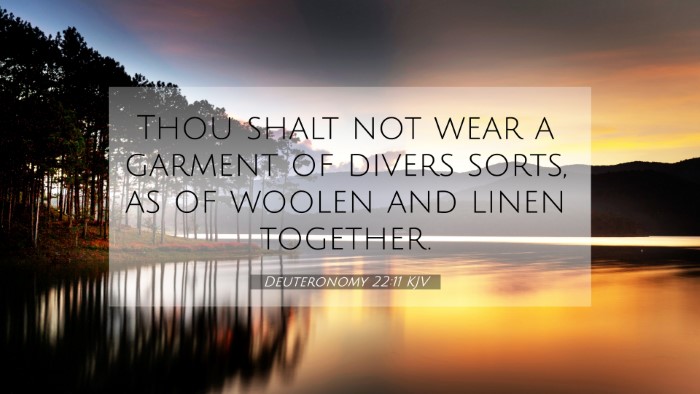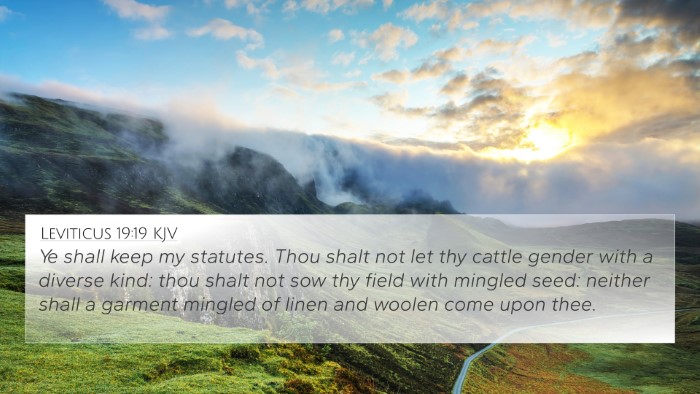Understanding Deuteronomy 22:11
Verse: "Thou shalt not wear a garment of divers sorts, as of woollen and linen together." (Deuteronomy 22:11)
General Context
Deuteronomy 22:11 is part of the Mosaic laws that aimed to set the Israelites apart from other nations and to instill discipline in their daily lives. This verse specifically addresses the issue of mixed fabrics, pointing towards a broader principle of purity and separation.
Combined Insights from Public Domain Commentaries
This verse is often understood through various biblical commentaries, such as those by Matthew Henry, Albert Barnes, and Adam Clarke. Here are their insights combined:
- Matthew Henry: Emphasizes that the prohibition against wearing garments made of mixed fabrics symbolizes the need for purity in both actions and materials. This reflects a deeper spiritual truth, which is the call to live distinctively as God's people.
- Albert Barnes: Points out that this law demonstrates God's desire for His people to adhere to a standard of holiness that transcends mere actions; it encompasses their appearance and identity. The mixing of materials is viewed metaphorically as an introduction of confusion into one's faith.
- Adam Clarke: Suggests that clothing made from mixed fibers could represent a compromise in moral and spiritual life. The verse may serve as an allegorical reminder to avoid the blending of worldly influences with divine commandments.
Thematic Connections
Deuteronomy 22:11 can be understood within a larger context by exploring the following themes and connections:
- Separation: The idea of maintaining distinctive features in the life of a believer connects to various Old Testament laws intended to keep the Israelites from assimilating with pagan cultures.
- Spiritual Purity: Just as the law forbids mixed fabrics, it serves as a metaphor for the believer’s life, urging them to avoid any mixture of righteousness with unrighteousness.
- Holiness: This verse reflects God's call to holiness, echoed in various other scripture passages that stress the importance of living in a way that honors God.
Cross-References to Deuteronomy 22:11
The following scriptures provide valuable insights and parallels to the themes expressed in Deuteronomy 22:11:
- Leviticus 19:19: "Ye shall keep my statutes. Thou shalt not let thy cattle gender with a diverse kind. Thou shalt not sow thy field with mingled seed…" This verse aligns with the principle of separation in various areas of life.
- 2 Corinthians 6:14: "Be ye not unequally yoked together with unbelievers…" This New Testament reference emphasizes the theme of purity and not mixing with the ungodly.
- 1 Peter 1:15-16: "But as he which hath called you is holy, so be ye holy in all manner of conversation; Because it is written, Be ye holy; for I am holy." The call to holiness resonates throughout scripture.
- Romans 12:2: "And be not conformed to this world: but be ye transformed by the renewing of your mind…" This aligns with the call for distinctiveness in one's faith and practice.
- Matthew 5:14: "Ye are the light of the world. A city that is set on a hill cannot be hid." This speaks to the distinction that believers are called to.
- James 1:27: "Pure religion and undefiled before God and the Father is this, To visit the fatherless and widows in their affliction, and to keep himself unspotted from the world." This verse emphasizes maintaining purity.
- Colossians 3:2: "Set your affection on things above, not on things on the earth." This reflects a call to transcend the worldly and stay focused on heavenly concerns.
Practical Applications
In light of these insights, believers can consider the following applications:
- Personal Holiness: Strive to live in a way that is distinctly aligned with God's character, avoiding any compromise that dilutes one's faith.
- Spiritual Discernment: Cultivating awareness of influences that may lead to a mixing of worldly and spiritual principles is essential for spiritual health.
- Community Impact: Encourage fellow believers to pursue a life of integrity that sets a standard in their communities, reflecting Christ's light.
Conclusion
Deuteronomy 22:11 serves as a powerful reminder of God's call for His people to maintain purity and distinctiveness in all aspects of life. Through insights gathered from well-respected biblical commentaries and cross-references, it becomes apparent that this principle of separation is not merely about external actions, but rather points to a deeper spiritual reality.
For those seeking a deeper understanding of this and related verses, visiting commentaries, using tools for Bible cross-referencing, and engaging in cross-reference Bible studies can illuminate many connections throughout both the Old and New Testaments.



